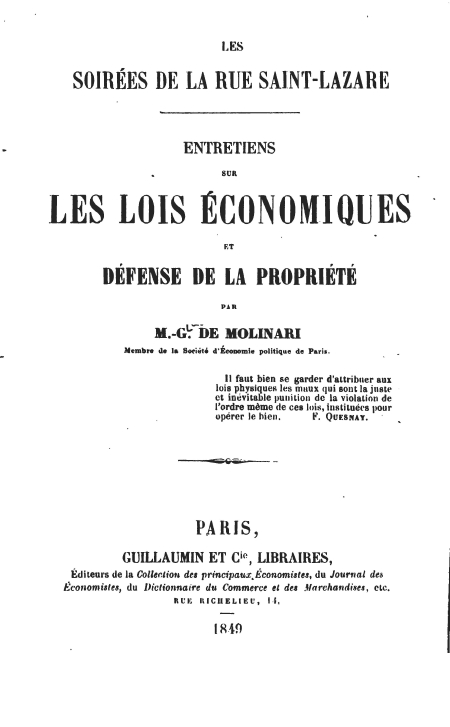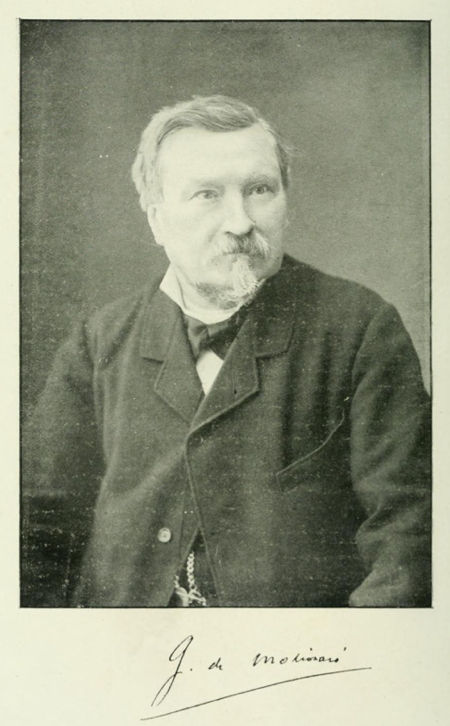
Gustave de Molinari, On the Different Kinds of Liberties and Entrepreneurs (1849-1863)
Updated: November 11, 2020
Gustave de Molinari (1819-1912)
[Commemorating the Centennial of his death at 92 years of age on 28 January, 1912 in Adinkerke, Belgium]
 |
 |
Molinari on the Different Kinds of Liberty, Property, and Entrepreneurs
Introduction
As I work on the translation of Molinari's Les Soirées de la rue Saint-Lazare (1849) I come across interesting aspects of Molinari's thought which I think require further explanation and analysis. I plan to add this to footnotes and glossaries which will accompany the book. Here is a foretaste of what is to come.
The first piece deals with Molinari's list of specific liberties which he mentioned in his important theoretical writings between 1849 and 1863. This period covered his actitivities as a journalist during the 1848 revolution and then as a professor of economics at the Musée royal de l'industrie belge in Brussells after he left Paris to excape the political crack-down which came in the wake of the coming to power of Napoleon III. These works include the collection of his journal ariucles which he complied in 1861, Questions d'économie politique et de droit public. 2 vols., the treatise on economic theory which was the product of his formal lectures at Musée royal , the first edition of which appeared in 1855 and a revised and enlarged edition of which appeared in 1863. In the revised edition of the Cours (1863) Molianri provides thean interesting categorization of the main kinds (modes) of property and the “liberty” which corresponds to that form of property. He tihnks there are 6 major groups which merit discussion.
The second piece deals with the Molinari's use of the word "entrepreneur" in the Soirées (1849). He builds on the work of Jean-Baptiste Say who gave the entrepreneur a major role in the free market in his work Traité d'économie politique (1803). The frequent use of the word "entrepreneur" was a fairly general one but he linked the work to 12 specific economic activities which are listed below. There are some surprising types of entrepreneurial activity in his list.
Contents of this page:
- Molinari on the Different Kinds of Libert and Property
- Molinari on the Different Kinds of Entrepreneurs
Sources
Molinari, Les Soirées de la rue Saint-Lazare; entretiens sur les lois économiques et défense de la propriété. (Paris: Guillaumin, 1849). [PDF 12.1 MB]
- See my translation of the 11th Soirée
- Les Soirées in French [HTML]
- Selected draft chapters of a new translation of Les Soirées
Molinari, Questions d'économie politique et de droit public (Paris: Guillaumin; Brussels: Lacroix, 1861), 2 vols.
Molinari, Cours d'économie politique, professé au Musée royal de l'industrie belge, 2 vols. (Bruxelles: Librairie polytechnique d'Aug. Decq, 1855).
- Vol. 1. La Production et la distribution des richesses [PDF 9.3 MB]
- Vol. 2. (missing from my collection)
Molinari, Gustave de, Cours d'Économie politique. 1st edition 1855. 2nd revised and enlarged edition (Bruxelles et Leipzig: A Lacroix, Ver broeckoven; Paris: Guillaumin, 1863).
- Tome I: La production et la distribution des richesses [PDF 11.6 MB].
- Tome II: La circulation et la consommations des richesses [PDF 13.5 MB].
Further Material on Molinari
For additional information about Molinari see the following:
- a fuller bibliography of the writings of Molinari
- biographical details of his life
- my thesis on Molinari's political thought
Molinari on the Different Kinds of Liberty and Property
The “9 Libertés” in Les Soirées (1849)
Molinari talks about 9 different types of “libertés” in the Soirées (1849):
la liberté:
- du travail [liberty of working]
- de l’enseignement [liberty of education]
- du commerce [liberty of commerce - another way of saying free trade]
- de gouvernement [liberty of government, i.e. the competitive provision of security in the free market]
- de l’héritage [liberty of inheritancve]
- des communications [liberty of communication (of both information and goods]
- de mouvement [liberty of movement (of both people and goods)]
- des échanges [liberty of exchange, i.e. free trade]
- des banques [liberty of banks and banking, i.e. free banking]
The 10 Liberties in Questions d'économie politique (1861)
Molinari draws up a slightly different list of 10 key liberties in Questions d'économie politique et de droit public (1861). Those is bold are the same in both lists:
la liberté:
- du travail [liberty of working]
- de l’enseignement [liberty of education]
- du commerce [liberty of commerce - another way of saying free trade]
- de gouvernement [liberty of government, i.e. the competitive provision of security in the free market]
- des associations [liberty of forming political associations, unions, and other groups]
- du crédit [liberty of credit, i.e. the liberty of banks and other institutions to issue credit to their customers]
- de la charité [liberty of providing charity, i.e. privately and voluntarily not through state agencies]
- des cultes [liberty of religion, i.e. no established church and no government subsidies to religious organisations]]
- des théâtres [liberty of theatrical productions]
- des inventions [liberty of inventions, i.e. protection for property in intellectual property]
The 6 Major Categories of Property and their Corresponding Type of “Liberty” in Cours d’économie politique (1863)
Molinari added a new chapter in the 2nd edition of Cours d’economie politique (1863) which had not been in the 1st edition of 1855: vol. 1, 4e Leçon "La valeur et la propriété". He provides the following categorization of the main kinds (modes) of property and the “liberty” which corresponds to that form of property (into 6 major groups):
L’homme qui possède des valeurs est investi du droit naturel d’en user et d’en disposer selon sa volonté. Les valeurs possédées peuvent être détruites ou conservées, transmises à titre d’échange, de don ou de legs. A chacun de ces modes d’usage, d’emploi ou de disposition de la propriété correspond une liberté.
Énumérons ces libertés dans lesquelles se ramifie le droit de propriété.
- Liberté d’appliquer directement les valeurs créées ou acquises à la satisfaction des besoins de celui qui les possède, ou liberté de consommation.
- Liberté de les employer à produire d’autres valeurs, ou liberté de l’industrie et des professions.
- Liberté de les joindre à des valeurs appartenant à autrui pour en faire un instrument de production plus efficace, ou liberté d’association.
- Liberté de les échanger dans l’espace et dans le temps, c’est à dire dans le lieu et dans le moment où l’on estime que cet échange sera le plus utile, ou liberté des échanges.
- Liberté de les prêter, c’est à dire de transmettre à des conditions librement débattues la jouissance d’un capital ou liberté du crédit.
- Liberté de les donner ou de les léguer, c’est à dire de transmettre à titre gratuit les valeurs que l’on possède, ou liberté des dons et legs.
Telles sont les libertés spéciales ou, ce qui revient au même, tels sont les droits particuliers dans lesquels se ramifie le droit général de propriété.
Translation:
A man who possesses things of value is endowed with the natural right to use and dispose of them as he sees fit. The things of value so possessed can be destroyed or preserved, transferred by means of exchange, gift, or bequest. To each of these modes of use, employment, or disposition of property, corresponds a (particular kind of) liberty.
Let us list these liberties which the right of property is divided:
- The liberty of directly using created or acquired things of value for the satisfaction of the needs of whomever possesses them, that is "the liberty of consumption."
- The liberty of employing them (things of value) to produce other things of value, that is "the liberty of industry and the professions."
- The liberty of combining them to the things of value belonging to another person in order to create a more efficient instrument of production, that is "the liberty of association."
- The liberty of exchanging them across space and time, that is to say in a place and at a time when one believes that this exchange will be the most useful, that is "the liberty of trade” (free trade).
- The liberty of lending them, that is to say to transmit (pass on, hand over?) to another person the enjoyment of some capital under conditions which have been freely negotiated, that is "the liberty of credit."
- The liberty of giving or bequeathing them, that is to say to transmit freely to another person the things of value which one possesses, that is "the liberty of gifting or bequesting."
These are the main types of (spécial) liberties, or what amounts to the same thing, these are the particular rights into which the general right of property is divided.
Other kinds of liberties mentioned in Cours d’economie politique (1863):
- du marché [liberty of the market, i.e the free market]
- de se gouverner [liberty of governing oneself]
- de la réproduction (la liberté d'initiative de l'individu en matière de la réproduction - 6th Leçcon) [liberty of reproduction]
- des contrats [liberty of contracts]
- du crédit et du monnayage [liberty to issue credit and to mint coins]
- des poids et mesure (mesurage) [liberty to choose the type of weights and measures used in economic transactions]
- des cultes [liberty of religion]
- de commerce absolue [aboslute freedom of commerce]
- du gouvernement [liberty of government, i.e. the competitive provision of security in the free market]
- la liberté d’user ou de disposer des valeurs [liberty to use or dispose of the value one has produced]
- de l’enseignement [liberty of education]
- de la charité [liberty of providing charity, i.e. privately and voluntarily not through state agencies]
- la liberté du prêt sur gages [liberty to engage in pawn broking, i.e. short term loans at high interest]
Molinari on the Different Kinds of Entrepreneurs
Molinari uses the word "entrepreneur” many times in Les Soirées. Most (17 instances) are used in a general sense either individually or in contrast with "ouvriers” (workers). Other uses of the word are to specify particular kinds of entrepreneurs or entrepreneurial activity, some to be expected (such as "entrepreneurs d'industrie” (industrial entrepreneurs) and others somewhat surprising ("entrepreneurs d'industrie agricole” (agricultural entrepreneurs) or "entrepreneurs de prostitution” (entrepreneurial brothel owners).
Here is a list of these different types of entrepreneurs or entrepreneurial activity (in order of frequency):
- entrepreneurs d'industrie (7) - industrial or manufacturing entrepreneurs
- entrepreneurs de production (2) - manufacturing entrepreneurs
- entrepreneurs du tissage (2) - entrepreneurs in the weaving industry
- entrepreneurs de prostitution (1) - entrepreneurs in the prostitution business
- entrepreneurs d'education (1) - entrepreneurs in the education business
- entrepreneurs de roulage (1) - entrepreneurs in the haulage business
- entrepreneurs d'industrie agricole (1) - entrepreneurs in the agriculture industry
- entrepreneurs de diligences (1) - entrepreneurs in the coach business
- entrepreneurs ou directeurs d'industrie (1) - entrepreneurs or directors of industrial enterprises
- entrepreneur de pompes funèbres (1) - entrepreneurs in the funeral business
- le laborieux entrepreneur, naguère ouvrier (1) - entrepreneurs who have emerged from the working class, i.e. "self-made" entrepreneurs
- non-entrepreneurs (1) - non-entrepreneurs
Also see Molinari’s linkage of government and entrepreneurs in Soirée no. 3, p. 96 (???). “Like any entrepreneur the government must do one thing and one only, or risk doing what it does very badly. All governments have as their main function the production of security. Let them confine themselves to that." (p. 96)